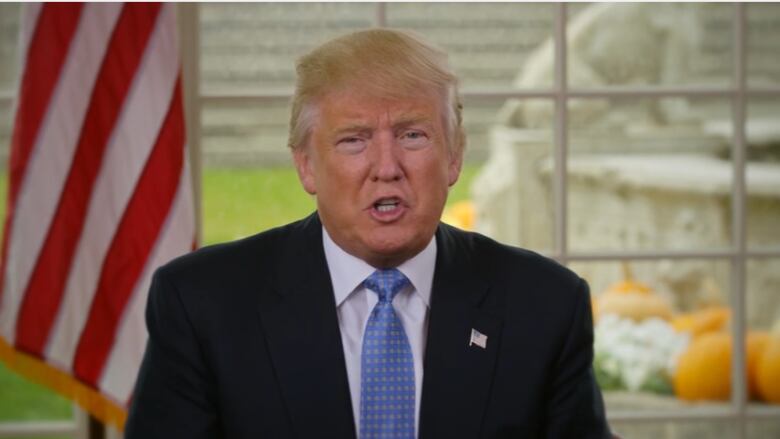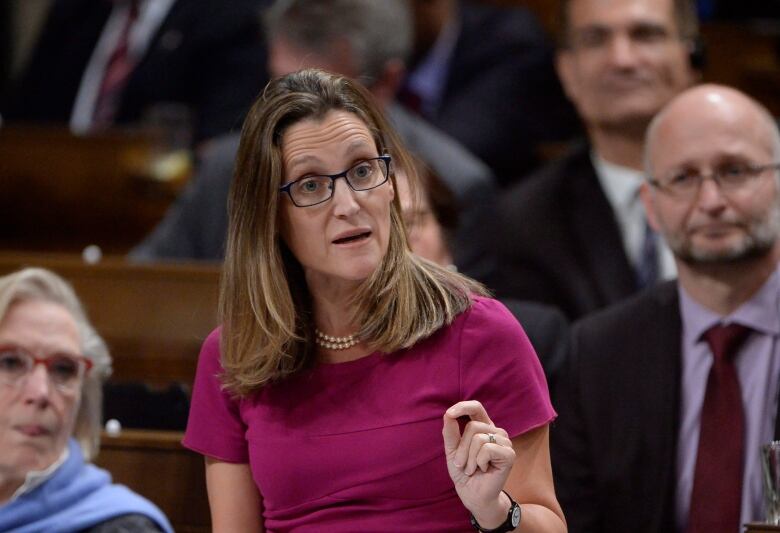The TPP is dead, so what does that mean for Canada?
Liberals never invested political capital in the trade deal, so they look less like a rejected partner

The United States and Japan were driving the bus during the Trans-Pacific Partnership negotiations.
The two largest economies in the 12-country Pacific Rim trade agreement had theeconomic muscleto get what they wanted from the smaller countries in the deal, Canada included.
Now president-elect Donald Trump has stopped thatbus with his announcement Monday he will pull out of the TPP his first day in office.
The TPP won't take effect if eitherthe U.S. orJapan fails toratify it. What other partners do no longer matters.
Although International Trade Minister Chrystia Freelandadded Canada's name to the TPP signing ceremony in Auckland, New Zealand, last winter, Prime Minister Justin Trudeau has never been full-throated in his endorsement, even when it could have beenpolitically useful tomore obviously support Barack Obama's legacy project.
"TPP was negotiated in the midst of our election campaign, and we madea commitment to talk to Canadians about it," Freeland said last weekend, pointing to all the consultationsthe governmentheldwithout committing to ratification.

Those conversations are why Canadians are able to support trade deals, she said, notingother countries at the Asia-Pacific Economic Co-operation (APEC) summit in Peru congratulatedCanadafor signing its trade deal with Europein the face of serious challenges.
Because Liberals never invested their ownpolitical capital in the TPP, they look less like a rejected partner now.
The Japanese leaders who met with Trump last week may not feelthe same. A ratification vote in Japan had appeared imminent, bolstering Obama'sfaint hope of getting Congress to ratify the TPP during its lame-duck session.
Never mind all thatnow.
What next with Japan?
Three of Canada's top five trading partners would have been inside the TPP, had it moved ahead.
But while the U.S. and Mexico already have a privileged trading relationship with Canada under the North American Free Trade Agreement (NAFTA) setting aside whatever renegotiations may be afoot TPP's demise means Canada loses its lift into the world's third-largest economy: Japan.
Canada doesn't have a bilateral trade deal there.
Export-oriented agriculture commodities, including grains and oilseeds like canola, stood to gain big billion-dollar big if Japanese tariffs came down.
Livestock producers, always keen to boost trade with Asia as itsmiddle-class appetite for meat keeps rising, also scored a significant win, although TPP'sphase-outperiod for beef tariffs, for example, was very gradual by trade deal standards.
Australia's advantage
Meanwhile, competitors like Australia already have tariff-free access to Japan.
The TPP was a negotiation full of multi-country tradeoffs. Itcan't applyto Canada and Japan only.
"If the Trump administration really turns its back on TPP, then Canada has an opportunity to lead like-minded countries on a new approach," wrote Claire Citeau, a spokeswoman for the Canadian Agri-Food Trade Alliance. "Why not take the fruit from seven years of negotiations and make it work for the other 11countries?"
Other farm commodities may breathe easier. Canada'ssupply-managed agriculture sector, including poultry, eggs and dairy, gave up a significant domestic market share in the final negotiations.
Nowthose previously anticipatedimports won't be a threat.
Bulwark against China
Beyond Japan, Canada'slost opportunities may be small.
An economic impact study made public this fall by Global Affairs Canada found that Canada was better off inside the TPP than out.
But theprojectedeconomic benefit was small relative tothe deal's scope,adding $4.3 billion annually to Canada's gross domestic product, or just over 0.1 per cent.
Canada had to join forces with Mexico to push back against automotive changes that could have threatened the privileged trading relationship it enjoyswith the U.S. under NAFTA.
On the other hand, the TPP could have brought new foreign investment into parts of southwestern Ontario desperate for a manufacturing boost, particularly if Japan saw supply-chain opportunities to blockother auto parts competitors, like China.
China remainsthe elephant in the room.
The 12 TPP countriesrepresent40 per cent of the world's GDP. China andIndiaweren't involved, but could have joined later.
To do so, they'd have to play by the new rules beyond tariff reductions, the agreement hadstandards for issueslike intellectual property andenvironmental and labour protection.
Who calls the shots?
Strategically, the TPPsought torunthe tablebefore China called all the shots.
"Remember when Obama said you want the United States to be making the rules in this region or otherwise it is China making the rules in this region? Well, that is actually what is going to happen," Laura Dawson from the Wilson Center told host Rosemary Barton on CBC News Network'sPower & Politics.
Trump'soperational preference seems to be bilateral. "He wants to do that one-on-one, mano a mano."
But Japan prefers regional or multilateral negotiations, she said.
#RCEP is China's alternative to the #TPP, building on membership & structure of 5 ASEAN FTAs. Learn about those here https://t.co/pZYQDiXYyR pic.twitter.com/CBtZbUAISo
—@DavidKleimannRem Korteweg, a senior research fellow at the Centre for European Reform, told EU Trade Insights thatTrump's strategy resemblesthe Chinese playbook.
Expect the U.S. to engage less with theEU, Japan and South Korea, which havea trade surplus with the U.S., he said.
Unlike Obama, Trump won't make trade deals a foreign policy tool, Korteweg told the online trade publication.Instead, he will take a "narrow, transactional approach to FTAs like China used to do."
President Xi calls for more promising future of China-Chile ties in a signed article in Chilean newspaper #XiVisit https://t.co/ow3RNHpjNX pic.twitter.com/y5kHmORzyO
—@XHNewsNew opportunities
Opponents of the TPPwon't cry over its grave.
"The demise of TPP is an opportunity," Jim Balsillie said.The tech entrepreneur, no fan of the deal's intellectual property clauses, actively campaignedagainst it as chair of the Council of Canadian Innovators.
"We need to grow our high-margin IP exportsbecause intellectual property is the most valuable asset in 21st century global trade," he said.
Freelandtried to spin positivelylast weekend, even as bilateral meetings with Mexico, Japan, New Zealand and Australia may have felt likea wake for theirhard-fought TPP.
"We are emerging today as one of the champions," she told reporters. "Our voice is increasingly recognized Canadians should take pride and comfort from that."
Freelandmet countries in other trade blocs like the Pacific Alliance (Latin America), Mercosur (South America) andthe Association of Southeast Asian Nations(ASEAN). All want to trade more with Canada, she said.
Abilateral trade push with China (and Hong Kong) continues.
But Canada has missed thisbuswith Japan. It's unclear when the next onecomes along.












_(720p).jpg)


 OFFICIAL HD MUSIC VIDEO.jpg)
.jpg)



























































































